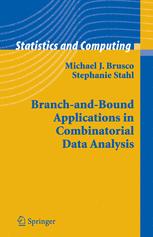

Most ebook files are in PDF format, so you can easily read them using various software such as Foxit Reader or directly on the Google Chrome browser.
Some ebook files are released by publishers in other formats such as .awz, .mobi, .epub, .fb2, etc. You may need to install specific software to read these formats on mobile/PC, such as Calibre.
Please read the tutorial at this link: https://ebookbell.com/faq
We offer FREE conversion to the popular formats you request; however, this may take some time. Therefore, right after payment, please email us, and we will try to provide the service as quickly as possible.
For some exceptional file formats or broken links (if any), please refrain from opening any disputes. Instead, email us first, and we will try to assist within a maximum of 6 hours.
EbookBell Team

0.0
0 reviewsThere are a variety of combinatorial optimization problems that are relevant to the examination of statistical data. Combinatorial problems arise in the clustering of a collection of objects, the seriation (sequencing or ordering) of objects, and the selection of variables for subsequent multivariate statistical analysis such as regression. The options for choosing a solution strategy in combinatorial data analysis can be overwhelming. Because some problems are too large or intractable for an optimal solution strategy, many researchers develop an over-reliance on heuristic methods to solve all combinatorial problems. However, with increasingly accessible computer power and ever-improving methodologies, optimal solution strategies have gained popularity for their ability to reduce unnecessary uncertainty. In this monograph, optimality is attained for nontrivially sized problems via the branch-and-bound paradigm.
For many combinatorial problems, branch-and-bound approaches have been proposed and/or developed. However, until now, there has not been a single resource in statistical data analysis to summarize and illustrate available methods for applying the branch-and-bound process. This monograph provides clear explanatory text, illustrative mathematics and algorithms, demonstrations of the iterative process, psuedocode, and well-developed examples for applications of the branch-and-bound paradigm to important problems in combinatorial data analysis. Supplementary material, such as computer programs, are provided on the world wide web.
Dr. Brusco is a Professor of Marketing and Operations Research at Florida State University, an editorial board member for the Journal of Classification, and a member of the Board of Directors for the Classification Society of North America. Stephanie Stahl is an author and researcher with years of experience in writing, editing, and quantitative psychology research.